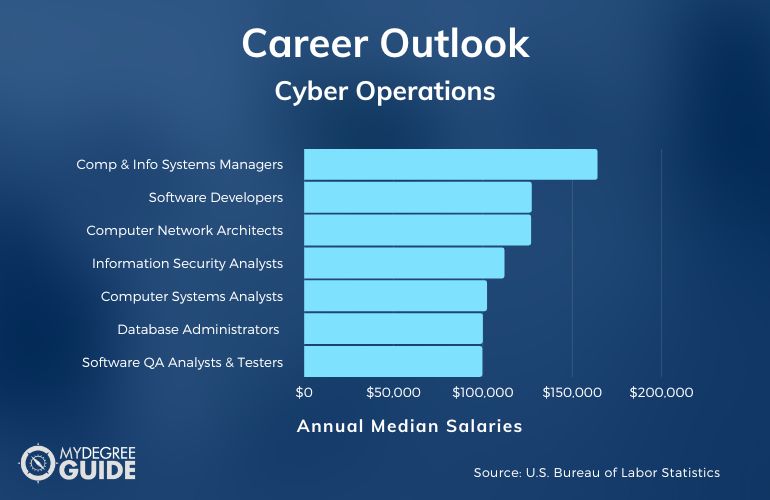If you are considering a career in the field of computer science, engineering, or information technology, you may want to explore whether a cyber operations degree is right for you.

IT and computing are becoming a greater part of most business functions. So, professionals who have a solid background in cyber management and security will be able to provide advice, analysis, and solutions for those wishing to maintain cyber security.
Editorial Listing ShortCode:
Let’s take a look at what getting an online cyber security degree could mean for you and your professional goals.
Universities Offering Online Bachelors in Cyber Operations Degree Programs
Methodology: The following school list is in alphabetical order. To be included, a college or university must be regionally accredited and offer degree programs online or in a hybrid format.
Athens State University
Athens State University offers a BS in Management of Cybersecurity Operations in a flexible online format. The curriculum aims to teach interdisciplinary skills in business and technology. Potential courses include Organizational Communication, Management Information Systems, and Management of Cybersecurity.
Athens State University is accredited by the Southern Association of Colleges and Schools Commission on Colleges.
Boise State University
Boise State University offers the opportunity to earn a BS or a BAS in Cyber Operations and Resilience. The programs are designed to help students develop career-ready skills in an asynchronous, online format with no in-person requirements. Virtual lab activities are offered to provide hands-on experiences. Industry partners provide Boise State students with free access to a variety of training resources.
Boise State University is accredited by the Northwest Commission on Colleges and Universities.
Dakota State University
Dakota State University offers a BS in Cyber Operations. The required labs are designed to teach how to analyze malware safely. The program offers opportunities to participate in competitions and other activities outside of class. The school offers a 4+1 program in this field. This program is a bachelor’s and master’s fast track that is designed to be completed in as little as 5 years.
Dakota State University is accredited by the Higher Learning Commission.
Excelsior University
A Bachelor of Science in Cybersecurity with a concentration in Cyber Operations is offered through Excelsior University. The program typically allows credit for prior work experience. The curriculum follows the academic requirements set by the Department of Homeland Security and the National Security Agency. The degree is available online.
Excelsior University is accredited by the Middle States Commission on Higher Education.
Harrisburg University of Science and Technology
Harrisburg University of Science and Technology offers an online Bachelor of Science in Cybersecurity Operations and Management with a concentration in Cyber Operations Management. The interdisciplinary curriculum covers topics such as management, legal and regulatory issues, computer science, and engineering. There may also be experiential learning opportunities.
Harrisburg University of Science and Technology is accredited by the Middle States Commission on Higher Education.
Minot State University
Minot State University offers a Bachelor of Science in Cybersecurity and Operations in both on-campus and real-time online formats. The courses are designed to teach theoretical knowledge and hands-on skills, such as ethical hacking, malware analysis, and applied cryptography.
Minot State University is accredited by the Higher Learning Commission.
Pennsylvania State University
Pennsylvania State University offers a Bachelor of Science in Cybersecurity Operations and Analytics. This online program features a holistic curriculum. Potential courses include Cyber-Defense Studio, Cyber Incident Handling and Response, and Statistics for Security and Risk Analysis.
Pennsylvania State University is accredited by the Middle States Commission on Higher Education.
University of Arizona
A Bachelor of Applied Science in Cyber Operations is available online at the University of Arizona. This NSA-designated program aims to teach offensive and defensive cybersecurity skills through its Cyber Virtual Learning Environment. The program also offers various areas of emphasis, including Cyber Law and Policy, Defense and Forensics, and Engineering.
The University of Arizona is accredited by the Higher Learning Commission.
University of Wisconsin – Stout
The University of Wisconsin – Stout offers the opportunity to earn a BS in Cybersecurity 100% online. This flexible program is designed to teach both theoretical and practical knowledge in a convenient format. UW Stout has been designated as a National Center of Academic Excellence in Cyber Defense by the NSA and the DHS.
UW-Stout is accredited by the Higher Learning Commission.
Utica University
Utica University’s BS in Cybersecurity: Cyber Operations program has received NSA and DHS designation as a leader in cybersecurity education. The program has 6 yearly start dates. The curriculum was developed with input from the Securities Exchange Commission and the Secret Service. Its real-world simulations are designed to help students develop practical skills for the workforce.
Utica University is accredited by the Middle States Commission on Higher Education.
Online Cyber Operations Degrees

From government agencies to small independent businesses, cyber security is an important consideration for nearly everyone who interacts with technology.
A cyber operations bachelor’s degree program can provide students with a solid background in many of the job functions related to a variety of computer- and IT-related roles. Students who pursue a cyber operations major will focus on the basics of computing and will also take specialized courses that help them hone their skills in information security concerns.
Some of the common skills learned in online cyber operations degree programs include:
- Computer literacy
- Programming
- Cyber forensics
- Cybersecurity
- Cloud computing
You can receive a thorough immersion into cyber operations in this major. Your coursework may cover everything from understanding how computers and networks work to being able to analyze the adequacy of a program, app, network, or software development from a security angle.
Depending on the program and concentration you choose, you may also learn about network defense, cryptography, and other methods used to address a variety of cyber threats. Those who earn their cyber operations degrees often use their skills to seek careers in government agencies, industrial or corporate businesses, healthcare, or educational settings.
An online cyber security degree path can be beneficial for many students. Some students are specifically interested in cyber forensics or computer defense systems, while others like that this degree program can help prepare them for a variety of computing careers.
Common Online Cyber Operations Bachelors Degree Concentrations

Within your cyber operations major, you may also have the opportunity to select a specific concentration so you can focus your studies on a certain area within the field.
Each school will offer their own unique concentrations and curriculum, but here a few common cyber operations concentrations:
- Engineering. This specialization details how computer networks and systems can be developed with security in mind, and it covers the sources of and types of cyber attacks.
- Law and Policy. In this track, students concentrate on the legal regulations and outcomes for cyber crimes, along with how internal policy can improve cyber security.
- Forensics. This concentration provides students with the knowledge for uncovering and analyzing suspicious behavior as well as mitigating potential cyber attacks through offensive and defensive cyber activity.
- Leadership. Students who focus on cyber management and leadership can learn about human resource development as well as roles and responsibilities for cyber security teams.
- Operations Management. This concentration allows students to focus on project management and the development of strategic cybersecurity infrastructures in a variety of scenarios.
When you select a concentration, your core courses and electives will often reflect the skills necessary in these specific fields.
Cyber Operations Careers & Salaries

The skills obtained through an online cyber operations degree can be useful for a variety of professionals. Whether you are more interested in systems management and networking or prefer software or database development, you might consider this degree path.
Many computer- and information technology-related professionals can benefit from a background in cyber operations. With this degree program, you can learn and practice a variety of methods for establishing cyber defense, detecting threats, and maintaining a secure computing environment.
According to the Bureau of Labor Statistics, here are the median salaries for career paths related to computer science and cyber operations.
| Careers | Annual Median Salaries |
| Computer and Information Systems Managers | $164,070 |
| Software Developers | $127,260 |
| Computer Network Architects | $126,900 |
| Information Security Analysts | $112,000 |
| Computer Systems Analysts | $102,240 |
| Database Administrators | $99,890 |
| Software Quality Assurance Analysts and Testers | $99,620 |
| Computer Occupations, All Other | $98,740 |
| Computer Programmers | $97,800 |
| Network and Computer Systems Administrators | $90,520 |
Professionals may work in roles within businesses, educational institutions, government agencies, or healthcare administration, to name just a few fields. In fact, it is difficult to identify a field that is not impacted by potential cyber threats, due to the prevalence of technology.
With many industries and fields impacted by cyber security threats, many employment opportunities for those with a background in cyber operations, including those with an online information security analysts degree, are continuing to grow. In fact, employment opportunities for information security analysts are anticipated to increase by 35% over the next ten years (Bureau of Labor Statistics).
Cyber Operations Bachelor’s Curriculum & Courses

While the premise of most online cyber security degree programs is similar, the courses that you take as part of your studies will be specific to the school you choose to attend.
Some common types of courses offered for cyber operations programs include:
- Cybersecurity Programming and Networking: In this course, you’ll learn the basics of how cybersecurity can be implemented in both programs and networks.
- Cybersecurity Analysis: This course helps you develop the skills necessary to review existing cybersecurity solutions and recommend updates or changes.
- Secure Software Engineering: You’ll have the opportunity to understand the role cyber security plays when developing and engineering software and apps.
- Computer Architecture: This course can help you gain an understanding of how a computer operates, and you’ll also study potential vulnerabilities to cyber attacks.
- Cyber Defense: In this course, you’ll review both offensive and defensive techniques involved in cyber attacks.
- IT Risk Management: You’ll learn how to prepare for, mitigate, recover from, and prevent potential risks in a variety of IT settings.
- Database Design and Organization: This course allows you to apply your cyber security knowledge to databases and data analytics.
- Intro to Computer Programming: You’ll learn a variety of computer programming languages, including JavaScript, C++, and others as related to your career goals.
- Information System Design: This course helps you appreciate the correlation between systems engineering and information security.
- Cloud Security and Governance: In this course, you’ll focus on cloud computing, and you’ll also cover the regulations and concerns for cyber operations professionals.
You may also take courses that dive deeper into areas such as programming languages, system design, and project management, depending on your concentration or focus.
Admissions Requirements

As you prepare to start the application process for a cyber management bachelor’s degree program, it’s helpful to review each program’s admissions requirements.
Each school will outline their own admissions requirements, but a few common ones include:
- SAT or ACT scores (only some schools require them)
- Official school transcripts
- Personal statement
- Letters of recommendation
You may also be asked to provide scholarly writing samples or a letter of intent that explains your interest in a cyber security major, including how previous coursework, such as an online associates in cyber security, has prepared you for further studies. Some schools also ask you to complete an interview with program staff.
Accreditation

When researching schools that offer online cyber operations degrees, it’s beneficial to pay attention to whether each school has received accreditation.
Regional accreditation is awarded to schools that have been evaluated by regional accreditors and have demonstrated academic excellence. For more information on accrediting organizations, you can check out the Council for Higher Education Accreditation (CHEA).
There can be many benefits to attending an accredited school. For instance, some employers and professional organizations request that applicants and candidates have received their education at an accredited institution. Some financial aid opportunities may also require recipients to attend an accredited school.
Additionally, many graduate programs, such as online MBA in Cybersecurity programs, accept course credits and degrees only if they are from accredited colleges and universities.
Financial Aid and Scholarships

College students who are interested in financial aid have several options they can explore. Those looking for need-based aid can complete the FAFSA, or Free Application for Federal Student Aid. This is the first step in determining your eligibility for federal aid.
You can also see what financial assistance opportunities your school may offer. Scholarships for academic or athletic performance, community involvement, or awards tied to your major may be available as well. You can also investigate scholarship opportunities from professional organizations, private donors, businesses, and community groups.
If you are currently employed, you might ask about any tuition reimbursement or educational assistance programs offered through your employer, too.
What Is a Cyber Operations Degree?

A cyber operations degree is an opportunity for IT and computer students to build upon their experience with specialized skills in security and emergency management. A cyber operations degree includes topics that are important to many computing professionals.
You may have courses ranging from understanding a variety of programming languages to conducting penetration testing. Cyber operations majors will focus on both the technical and ethical aspects of cyber management as well. This program can provide you with a holistic understanding of security concerns and considerations.
What Do Cyber Operations Do?

The day-to-day operations of cyber security professionals often vary depending on their specific role. For example, emergency management professionals are likely to work in a fast-paced environment where new challenges emerge every day.
Some common duties for those with a cyber operations background include monitoring threats, analyzing current security practices, and installing and implementing updates. Depending on the concentration and courses you select when studying for your cyber operations degree, you may focus more on programming, software, networks, or all of the above.
Is Cyber Operations a Good Career?

Yes, cyber operations is a good career for many professionals. The Bureau of Labor Statistics notes that employment rates are continuing to increase at a rapid rate for those in information security analysis and management roles. Software developers and testers are also in growing demand.
In fact, overall employment of computer and IT occupations is expected to increase by 15% over the next ten years, which is much faster than the average for all occupations. There are many factors that can impact your career in cyber management, though, including your location, experience level, and area of expertise.
What Skills Do You Learn in Cyber Operations?

Students who choose a cyber security major can explore a variety of different topics and concentrations. Throughout their studies, many students will develop skills in areas such as:
- Critical thinking
- Crisis prevention
- Emergency response
- Data analysis
- Solution development
These skills are often helpful in real-life situations, as professionals investigate systems, analyze current cyber defense mechanisms, and suggest or design new solutions to provide greater cyber security. These skills be useful not only in implementing cyber management concerns and resolutions but also in forensic and programming applications.
What Can You Do with a Bachelor’s Degree in Cyber Operations?

Many computing and IT professionals can benefit from a bachelor’s degree in cyber operations. Whether you prefer to work in an industrial, commercial, educational, or government field, technology professionals are needed to maintain and protect users from cyber security concerns.
As noted by the Bureau of Labor Statistics, many of these fields are experiencing faster than average growth and offer competitive median salaries. Some graduates apply their developed skill sets to network administration, software development, database building, or cyber forensics.
Is a Cyber Operations Degree Hard?

It’s hard to say whether a cyber operations degree will be challenging because everyone has different talents and study habits.
You may want to take a look at the curriculum of a few different schools to determine how you feel about the courses offered. As a cyber security major, you’ll likely be encouraged to take courses in basic programming, data analytics, threat identification, and defensive operations.
Courses on topics such as cyber security analysis will help you fine tune your ability to use all of these skills together, as you would in a professional capacity.
How Long Does It Take to Get a Cyber Operations Degree Online?

The amount of time it takes to earn your cyber operations degree online depends on the format of the program you select as well as your enrollment status. When enrolled in schools that follow a traditional 16 week semester, full-time students can typically complete a bachelor’s degree in 4 years.
Programs that follow an 8 week semester schedule may be completed in less time, provided you remain enrolled full-time and year-round, including during summer term. If you choose to enroll as a part-time student, it may take longer to earn your cyber operations degree.
Is a Cyber Operations Degree Program Worth It?

Yes, a cyber operations degree is worth it for many students. Having a background in cyber security can be helpful to many professionals in the computer and IT industry.
The Bureau of Labor Statistics reports many careers in these fields are growing at a rate much faster than the national average. For instance, 35% job growth is projected for information security analysts over the next ten years.
As a cyber operations major, you may have the opportunity to explore all areas of network, software, app, system, and program security to decide which area of cyber security is best for you and your long-term career goals.
Getting Your Cyber Security Operations Degree Online

If you are interested in a career in a computer science or IT field, you might consider whether getting an online cybersecurity operations degree aligns with your preferred career path.
Some cybersecurity operations majors are primarily interested in a specific area of designing, programming, analyzing, or networking, while others wish to explore the specific areas of cyber defense and forensics. You may also have the opportunity to select between various concentrations to fine tune your degree.
The sooner you start exploring online cyber operations degrees from accredited schools, the sooner you may find the program that best fits your educational and professional goals.
